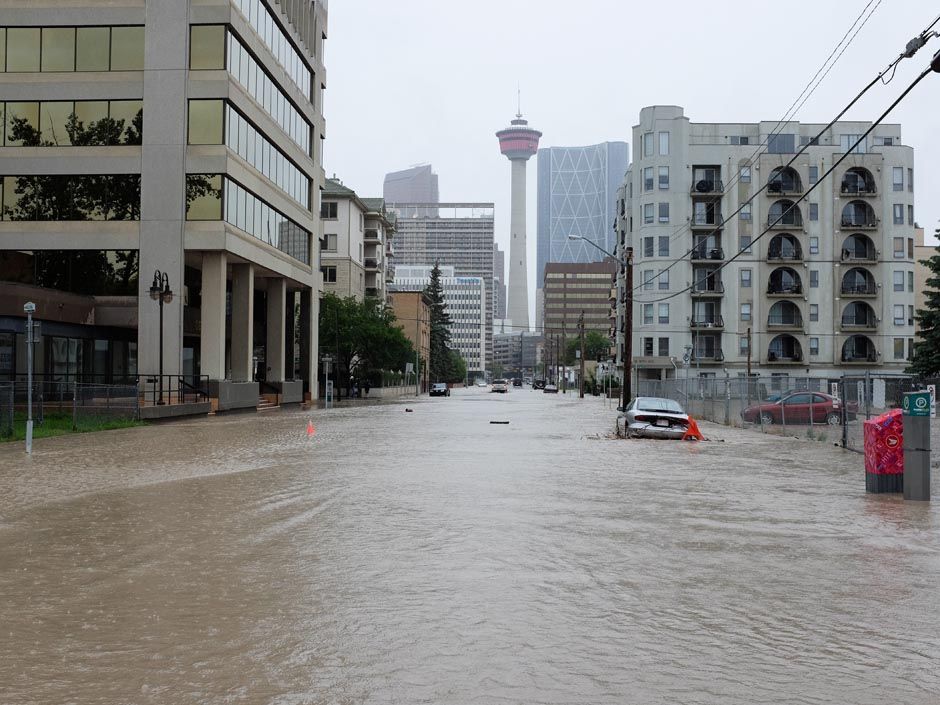Image: Jen Gerson / National Post
A 2020 study found that 94 percent of Canadians are unaware that they live in a flood-risk area. Floods are one of the most common and expensive disasters that occur in Canada, and they can be a major concern for businesses. Floods can happen in any type of region, at any time of year. The average cost of a claim from flood damage to a property is $43,000. Everyone has an important role to play in learning about proper flood preparation, and knowing what insurance coverage and risk information is available, in order to protect your home and workplace.
It is important to know the location of your home or business to assess if you are located on a floodway or flood fringe zone. Flood maps will vary according to the area you live in and the water surrounding that area. Calgary is most at risk for flooding between May 15 and July 15, because this is when the city receives the largest amount of rainfall (City of Calgary). Rainfall is the number one factor in creating a flood, but there are many other contributing factors. The potential flood impact on your company will also be affected by your type of business. Know the risks of your specific business and the level of exposure and impact that you may face.
Here are some of our top tips for flood preparation:
- Know your insurance policy regarding flooding
- Talk to your insurance provider to see if you are covered for overland flooding. It is also a good idea to make sure your insurer knows about any measures you are taking towards flood preparedness such as an emergency plan and business continuity plan.
- Assess the risks of your business and develop an emergency plan:
- Train all employees on emergency and evacuation procedures and have the evacuation plan easily accessible to employees.
- Know which individual(s) within your company will be responsible for leading and coordinating the emergency plan and evacuation procedures. Also note who will help move any equipment out of areas that are at high-risk of flooding.
- Make a plan for a temporary location if you are forced to relocate your business.
- Inventory and storage
- Maintain up-to-date financial information and an up-to-date inventory in order to support your insurance claim in the event of a loss.
- Have copies of important documents stored off-site, or on a cloud-based software like Google Drive, OneDrive, DropBox or ICloud.
- Develop a plan for where you will store valuable equipment, electrical equipment and other important items in an area safe from flood waters.
- If a flood warning or alert is issued, secure or remove all unsecured material on your property that could be swept away in a flood.
- Communication during a flood
- Think practically about how you can contact employees, customers, suppliers and stakeholders during flooding.
- Have employee and customer contact information backed up to a cloud-based software to allow for remote access.
- Develop one or more contact points outside of the impacted area.
- Follow public weather alerts and emergency alerts for your area, listen for warnings and advisories
If you are looking for more information on flood preparation, check out our article on anti-flooding tips to reduce your risk of damage to your home and vehicle.
Further Resources:
Flood Maps Listed by Province and Territory
Flood information websites for each Province and Territory
Emergency Management Organizations by Province and Territory
Read more: Anti-flooding tips for Spring: Protect your Home
Read more: Preparing for Winter: Preventing Burst Pipes
Fuse Insurance Ltd. is the evolution of the commercial insurance brokerage, and the first of its kind in Western Canada. Backed by policies from a selection of A-rated insurers, Fuse Insurance can provide coverage for businesses large and small from almost any industry. For further information or to get an online quote now, click here or call us at 1-866-387-FUSE (3873) for more details.
